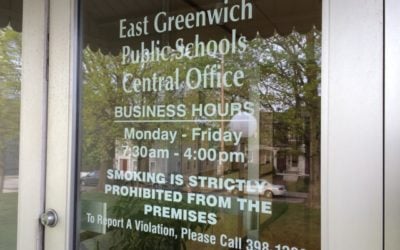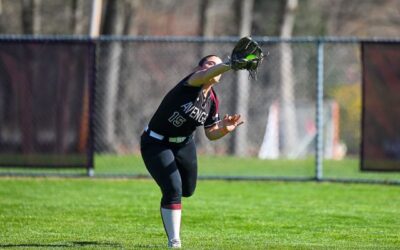By Nicole Bucka
This is not a formal communication of the entire East Greenwich School Committee.
During this fall’s election, I spoke with many East Greenwich residents and appreciated those who candidly asked: “What does a school committee do, exactly?” I think many people believe everything that happens in a school district is somehow the purview of the school committee. RI General Law states the powers and duties of school committee members are: “The entire care, control, and management of all public school interests…” § 16-2-9. While that sounds important, the care, control, and management is through certain formal roles that make up the majority of committee member influence. For the sake of simplicity, let’s separate what the law and Title 16 says the role of the school committee is from how committee members actually execute the role, which I try to explain below.
- The School Committee’s day-to-day role is to be an oversight body.
The committee is ethically bound to always act in the best interests of East Greenwich Public Schools – seeking out information, exploring all options to make the most prudent decision, avoiding conflicts of interest, etc. The school committee executes its role collaboratively, as an oversight body, with the superintendent. It’s a relationship that requires thoughtful exchange aligned to the vision for the district (our Strategic Plan), mutual respect, and boundaries. A common ‘newbie’ lesson learned is that we (committee and the superintendent) have to respect one another’s boundaries. For example, the school committee has to hold the superintendent accountable for progress towards the vision/strategic plan, but it is over-stepping if we dictate how the superintendent should do that. The school committee’s role is not to dictate the day-to-day operations of the school district. The school committee hires a strong superintendent, evaluates how the superintendent is leading the district towards the shared vision, and evaluates the superintendent. The role of the school committee is oversight and accountability specific to the superintendent.
- The school committee develops local education policy.
Policy is one of the most important and impactful roles a school committee has. In the simplest of terms, policy defines what the district commits to, its principles and assurances. First, policy has to be in line with the law and regulation. That’s the easy part. Next, there is robust conversation about the “intent” of the law or regulation and whether, because of our vision in EG, we commit to going further/adding more assurances than the legal minimum. Policy work occurs in a subcommittee (namely, the policy subcommittee, but the others weigh in on policies related to their focus) and then goes to the full committee at a school committee meeting twice. Again, the school committee doesn’t dictate how policy plays out in operations, that’s the superintendent’s role, but policy outlines the agreed upon non negotiables. This subcommittee includes the superintendent, the head of human resources, finance, a building administrator and members of the public because a policy has to meet the needs of all stakeholders. It is important to a school committee and superintedent’s relationship that the district’s policies are being followed.
- The School Committee’s day-to-day role is to support implementation of the vision (i.e., the Strategic Plan) through subcommittee work.
As an elected official, I am a public servant. I am here to do my part in moving the district to our shared vision and to responding to community needs through policy revisions, etc. Depending on where we are in a process (e.g., gathering community feedback for a strategic plan, setting a strategic plan, measuring progress on its implementation, etc.), subcommittees exist or are formed for a specific purpose that is either required by regulation or in our school committee bylaws because it is inherent to the role. Currently, the subcommittees that are in our bylaws are: Health and Wellness, Finance and Revenue, Policy, Personnel, Facilities, and Special Education Advisory Committee. Subcommittees allow each school committee member the opportunity to contribute more subject-matter expertise beyond broadly serving on the body. That is why having a diverse school committee like we currently have (i.e., an educator, two lawyers, two business people, a math professor, and a social worker) is a wonderful thing. Again, the power isn’t bestowed in school committee members alone. Subcommittees are made up of a cross-representation of stakeholders (including members of the public) and are held in open public meetings anyone can join.
- The School Committee provides budgetary oversight and expenditure approval.
The school committee reviews a budget prepared by our superintendent, seeking out additional information at public budget workshops. Then, once the school committee approves a final budget, the funds are requested from the town. Our school system is funded by federal dollars (e.g., 7 percent of operating expenses in 2020-21), state dollars (8 percent), and local/town tax dollars (85 percent). In other, less affluent communities, the state education funding formula allocates larger portions of state funds to those communities’ budget, so their school committees have control over a larger portion of funds without relying so heavily on their town appropriation. Complicating further our heavy reliance on the town is that while EG doesn’t receive much state funding, our school district is responsible to comply with frequent state education mandates (often expensive). Have you seen any of the dramatic moments in the past when a sports program or language was considered for cuts? School committee members bear the burden of that responsibility with little control over the inputs that bring the budget to that point. This is one of the more frustrating aspects of this role and something the current committee and town council have worked hard at making a more collaborative process in hopes of improving it for all involved. It is truly a difficult position all around.
- The School Committee enters into professional contracts.
As sort of an amalgamation of the oversight roles defined above, the school committee’s role includes working with the superintendent and unions to enter into professional contracts. How is it an amalgamation? The committee’s oversight includes assured compliance with the law, with local policy, with enacting the vision/strategic plan, meeting the needs of the community stakeholders, and within budgetary/expenditure limitations (again, without the ability to assure state, federal or town appropriation beyond maintenance of effort).
I hope this piece is helpful to East Greenwich residents. What questions do you still have? Let’s keep the conversations going beyond election season.
Nicole Bucka is vice chair of the East Greenwich School Committee.






 Subscribe
Subscribe